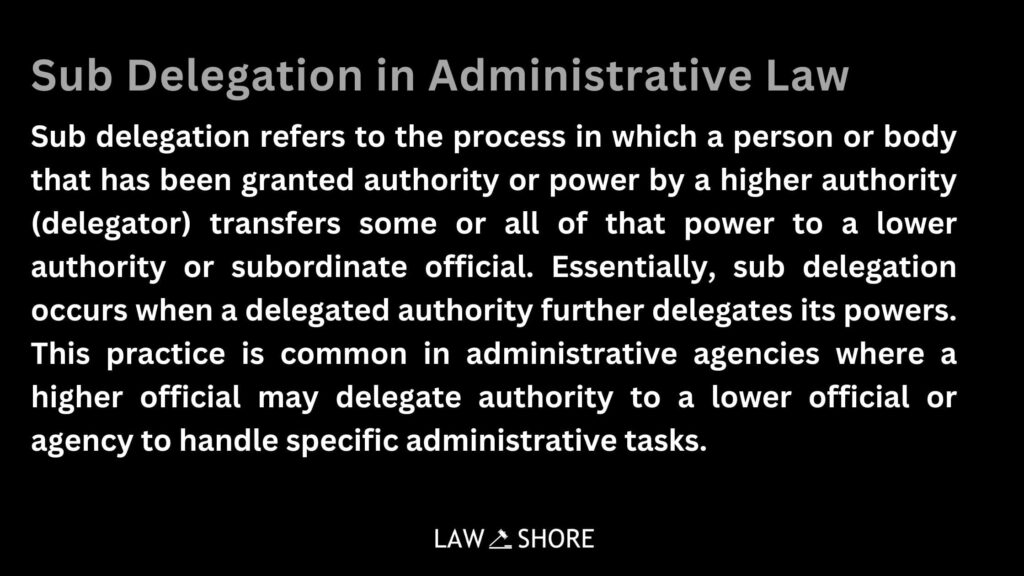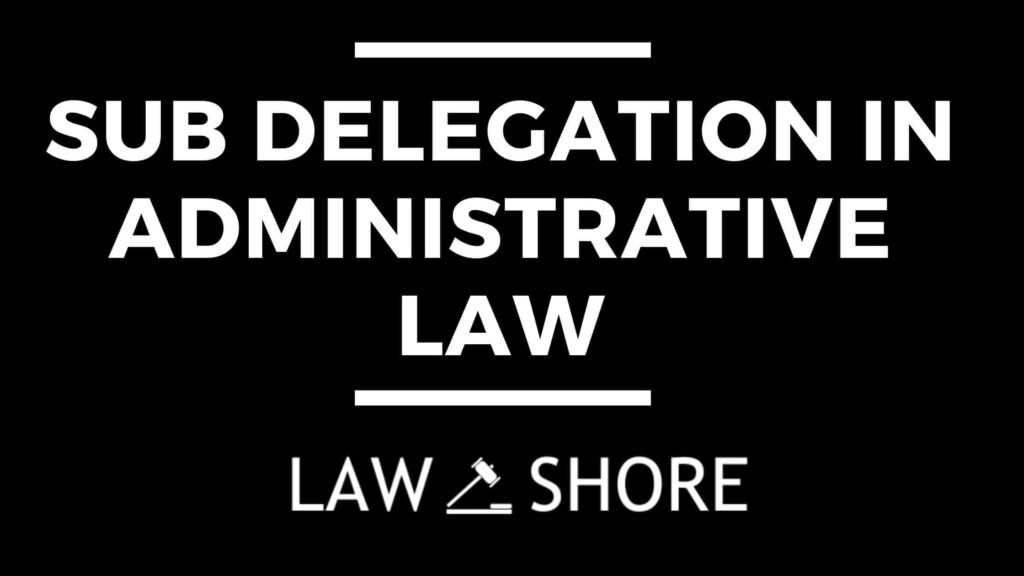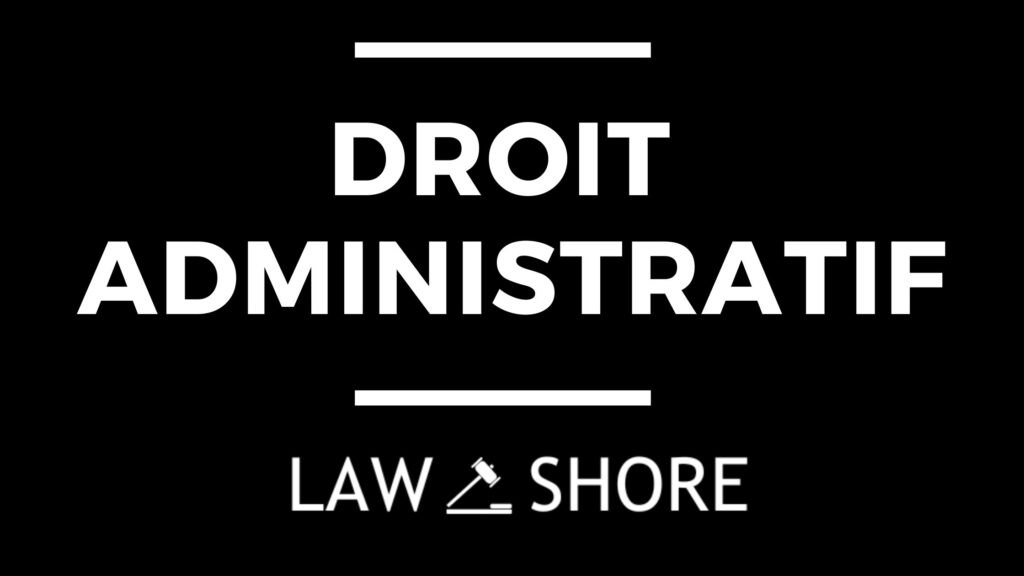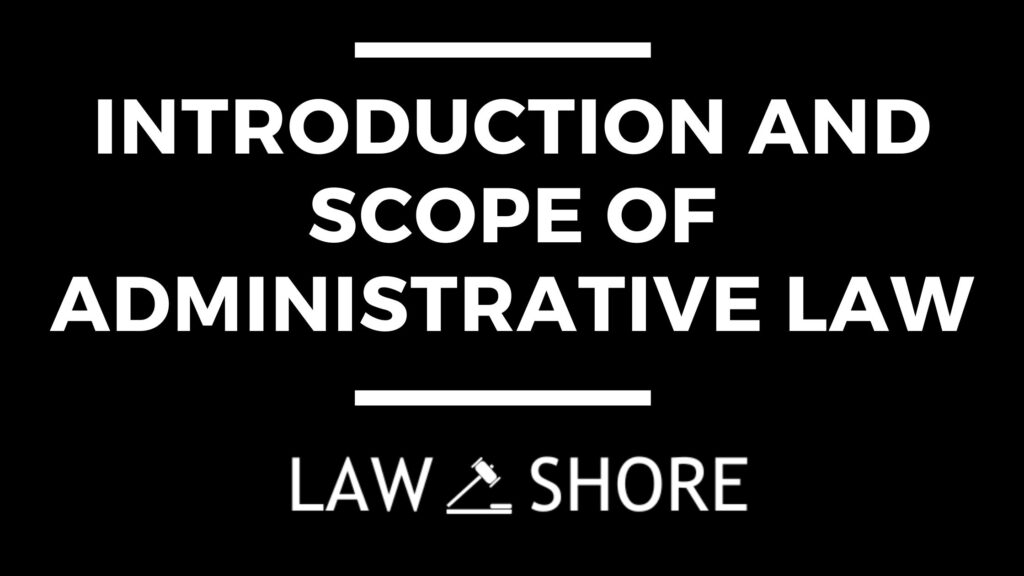Sub Delegation in Administrative Law
Table of Contents
ToggleMeaning and Definition of Sub Delegation in Administrative Law

Sub delegation refers to the process in which a person or body that has been granted authority or power by a higher authority (delegator) transfers some or all of that power to a lower authority or subordinate official. Essentially, sub delegation in Administrative Law occurs when a delegated authority further delegates its powers. This practice is common in administrative agencies where a higher official may delegate authority to a lower official or agency to handle specific administrative tasks.
Sub delegation in administrative law refers to the practice where an authority, after receiving delegated powers, transfers some or all of those powers to another lower authority or official. While sub delegation can improve administrative efficiency, it also raises legal and constitutional concerns, particularly regarding the limits of delegation and the accountability of the parties involved.
To help understand this concept better, here are three illustrations of sub delegation in different contexts:
Illustration 1: Delegation of Powers in Government Ministries
Scenario: A Minister in the Union Government is entrusted with powers to issue certain regulatory guidelines related to a specific industry. However, due to the vast scope of the industry and the complexity of the issues involved, the Minister may delegate this authority to the Secretary of the concerned department, who oversees the day-to-day operations.
Sub Delegation: The Secretary, in turn, may decide to sub-delegate the task of drafting specific regulations to an Assistant Secretary or an expert committee within the department. This allows for more focused attention on the specialized aspects of the regulation, which would be difficult for the Minister or the Secretary to manage alone.
Explanation: Here, the Secretary is exercising sub delegation by transferring authority to a subordinate official. While the Secretary retains overall accountability for the regulatory process, the Assistant Secretary or expert committee carries out the detailed work. The sub delegation must adhere to the limits of the original delegation, which in this case, stems from the Minister’s authority granted under the law.
Legal Consideration: For this sub delegation to be valid, the original delegation of power by the Minister must include provisions allowing for further delegation. If there is no express authorization, this sub delegation may be deemed invalid.
Illustration 2: Delegation and Sub Delegation in Local Government Administration
Scenario: A state government delegates certain administrative powers to local municipalities to manage urban development and infrastructure projects. This delegation includes the authority to approve specific types of construction permits within the city.
Sub Delegation: The municipal corporation, which holds this delegated authority, finds that managing all the permit applications is overwhelming. Therefore, it sub-delegates the authority to approve smaller projects (such as residential permits) to a district-level officer or a special task force within the corporation.
Explanation: In this case, the municipal corporation has sub-delegated its power to a district-level officer. The district-level officer is responsible for approving the permits, but their actions are still within the scope of the original powers delegated by the state government. The municipality remains accountable for the actions of the district-level officer.
Legal Consideration: The key issue in this illustration is whether the state government’s delegation of powers to the municipality explicitly allowed for further sub delegation. If the law did not grant permission for sub delegation, then the municipal corporation’s act of sub-delegating could be considered ultra vires (beyond its legal authority).
Illustration 3: Sub Delegation in Regulatory Authorities
Scenario: A national regulatory body, such as the Securities and Exchange Board of India (SEBI), is granted the power by Parliament to issue regulations related to financial markets. SEBI delegates its powers to its senior officials to issue specific circulars or guidelines on market conduct.
Sub Delegation: To ensure that all aspects of the regulations are properly enforced, SEBI’s senior officials may sub-delegate certain operational powers, such as approving compliance reports or monitoring financial entities, to lower-level officers within the enforcement division.
Explanation: In this example, the senior officials of SEBI have sub-delegated powers to lower-level officers, who then carry out day-to-day monitoring and compliance tasks. The original delegation of power by Parliament to SEBI allows for such delegation and sub delegation, but the sub-delegates (the lower-level officers) must still act within the regulatory framework established by SEBI’s senior officials.
Legal Consideration: The question here is whether the enabling statute under which SEBI operates explicitly allows for the sub delegation of certain powers to lower-level officers. If the statute is silent or restrictive about sub delegation, such actions may be legally challenged.
Origin of Sub Delegation in Administrative Law
The practice of sub delegation in Administrative Law emerged as a practical necessity in the growth of the state and its bureaucracy. With the expansion of governmental functions and the increasing complexity of governance, administrative bodies needed to distribute tasks to ensure efficiency. As public administration grew, the delegation of powers to lower levels became essential for day-to-day functioning.
Historically, the idea of delegating and sub-delegating powers can be traced back to early administrative practices, particularly in European countries that developed sophisticated systems of government bureaucracy. Sub delegation became a key part of modern governance, particularly in countries with large bureaucratic structures where top-level officials could not handle all the responsibilities alone.
Key Features of Sub Delegation in Administrative Law
Sub delegation in Administrative Law, while useful for the functioning of government, is governed by specific principles and limitations:
- Legal Basis: Sub delegation requires a clear and explicit legal basis. If a statute or regulation allows for the delegation of power, the question arises whether the delegator is authorized to sub-delegate those powers. In many cases, sub delegation is only permissible if specifically authorized by law.
- Accountability: One of the key features of sub delegation is that the original delegator remains accountable for the exercise of delegated powers, even if they are sub-delegated. This ensures that the original authority cannot evade responsibility for decisions made by the sub-delegated official or body.
- Limited Power: In some cases, the delegation of power can only be exercised within certain limits, such as specific tasks or issues. sub delegation should not extend beyond the scope of the original delegation, and the sub-delegate must operate within the defined legal limits.
- Conditions of Sub Delegation: sub delegation is not automatically granted. In most jurisdictions, it can only occur under certain conditions, which are typically defined in the enabling legislation or regulations.
Importance of Sub delegation in Administrative Law
- Enhances Efficiency in Governance
Sub delegation allows lower authorities to handle routine administrative tasks, reducing the workload of higher authorities and speeding up decision-making in government functions. - Enables Specialization
Sub delegation empowers specialized officials to deal with complex issues, improving decision quality and ensuring that governance is handled by experts in relevant fields. - Facilitates Administrative Flexibility
Sub delegation makes the administrative system more adaptable to changing circumstances by allowing local authorities to address emerging challenges quickly. - Improves Accountability at Lower Levels
It ensures that lower-level officials are directly accountable for their actions, promoting better oversight and transparency in administrative decision-making. - Strengthens Democratic Governance
Involving local and regional officials in decision-making through sub delegation enhances public participation and better represents the interests of local communities. - Reduces Burden on Higher Authorities
By delegating authority to lower levels, higher authorities can focus on strategic policymaking, while operational matters are handled at lower levels, ensuring a smoother governance process. - Fosters Professionalism in Public Administration
Sub delegation ensures that tasks are handled by competent, trained officials, promoting professionalism and expertise in India’s bureaucracy. - Improves Public Service Delivery
Localized decision-making helps improve the delivery of public services by addressing issues more effectively and promptly at the grassroots level. - Ensures Effective Regulation and Enforcement
In regulatory bodies, sub delegation ensures that power is distributed for consistent enforcement of laws and regulations across various levels, increasing compliance. - Promotes Transparency and Legitimacy
Properly structured sub delegation, backed by legal authority, ensures that government actions are transparent and legitimate, increasing public trust in administrative processes.
Forms of Sub-Delegated Legislation
Sub delegation of legislative authority occurs in three distinct forms, which categorize the sub-delegated laws within the Indian legal framework:
Full or Partial Delegation
Full delegation occurs when the delegating authority grants complete discretion and power to the delegate or another authority, enabling them to act independently. For instance, an authority may grant permission to amend, change, or repeal laws. Conversely, partial delegation involves circumstances where the recipient of the authority must seek guidance or directions from the delegating authority on critical matters. An example of partial delegation can be seen in Section 5 of the Essential Commodities Act, 1955, where the delegated authority is required to act with the approval or guidance of the central government.
Conditional or Unconditional Delegation
Delegation is termed conditional when the delegated authority’s actions are subject to review, approval, or confirmation by a superior authority or when certain conditions must be met. On the other hand, unconditional delegation grants the recipient authority to act independently, with the same powers as the original authority. Section 3 of the Essential Commodities Act, 1955 provides an example, where the Central Government, having imposed restrictions on sugar, delegates authority to the Textile Commissioner to execute certain functions. Clause 10 further allows the Textile Commissioner to sub-delegate powers to others without conditions.
Skeleton Legislation
Skeleton legislation refers to laws enacted by a superior authority that set out only the basic framework or structure of a statute, without establishing specific policies or principles. The delegate or sub-delegate then fills in the gaps by making detailed policies or regulations within the framework provided, adhering to the guidelines set forth. The delegate must operate within the constraints of the broad parameters laid down by the parent legislation, ensuring consistency with the original legislative intent.
The Latin maxim “Delegatus non potest delegare“ translates to “A delegate cannot further delegate.” This principle is a fundamental concept in administrative law, particularly in the context of delegation of powers.
Meaning of the Maxim
The maxim asserts that when a person or body (the “delegator”) delegates its powers to another individual or body (the “delegate”), the delegate does not have the right to delegate those powers further, unless explicitly authorized by the delegating authority or the enabling legislation.
In other words, the individual or body to whom powers are delegated (the delegate) must exercise those powers personally and cannot pass them on to others without the explicit consent of the original authority.
Rationale Behind the Maxim
The principle ensures that delegation is controlled and that the delegation of powers does not lead to an unchecked distribution of authority. It maintains accountability and ensures that the original delegating authority retains ultimate control and responsibility over the powers granted. The rationale is that when an authority delegates power, it does so with trust that the delegate will use the power properly. Allowing further delegation could potentially undermine the purpose of delegation and reduce accountability.
Exceptions to the Maxim
While the general rule is that a delegate cannot sub-delegate, there are exceptions:
- Explicit Authorization: If the original legislation or delegating authority explicitly permits the delegate to further sub-delegate, this can override the maxim. In such cases, sub delegation is permitted within the boundaries defined by the original authority.
- Ministerial Acts: In some cases, where the action to be performed is purely ministerial or administrative (without the exercise of discretion), sub delegation may be allowed. For example, a delegated authority may assign routine tasks to subordinates, but these tasks must still fall within the scope of the powers originally delegated.
Application in Indian Law
In Indian administrative law, the maxim “Delegatus non potest delegare” has been recognized and upheld by the courts in various cases. It has been applied to ensure that administrative powers are not exercised in an unchecked or unlawful manner. However, the principle is subject to certain exceptions, particularly when the enabling statute or the delegating authority expressly permits sub delegation in Administrative Law.
For example, in the case of State of Haryana v. Ratnam (2004), the Supreme Court held that a delegate cannot exercise powers beyond those explicitly conferred upon them by the delegating authority. The Court emphasized that the scope of delegation is determined by the terms of the delegation and that any sub delegation without specific authorization would be illegal.
The maxim “Delegatus non potest delegare” serves as a safeguard to prevent the unchecked and unauthorized distribution of powers. It ensures that delegated authority is exercised by the person or body to whom it was granted, thus promoting accountability and maintaining the integrity of the administrative process. However, the principle is not absolute, and exceptions can exist where the delegating authority expressly allows further delegation.
Relevant Constitutional Provisions in India Regarding Delegation and Sub Delegation in Administrative Law
While the Indian Constitution does not directly address the concept of sub delegation in Administrative Law, several articles in the Constitution indirectly touch upon the delegation of executive powers, which can extend to the practice of sub delegation. These provisions lay the foundation for understanding how powers are delegated by the Union or State Executives and the extent to which further delegation (or sub delegation) may be permissible.
Article 73 (Union Executive Powers)
- Text: “Subject to the provisions of this Constitution, the executive power of the Union shall extend to the matters with respect to which Parliament has power to make laws.”
- Implications for Delegation: Article 73 confers executive powers upon the President of India, allowing them to delegate those powers to various officials or bodies in the Union Government. However, the extent and scope of delegation (and by extension, sub delegation) are subject to constitutional limits and the laws made by Parliament. The President can delegate executive powers to Ministers, departments, or even lower officials, but any sub delegation must align with the legal and constitutional framework.
- Sub Delegation: If the President delegates certain executive functions to the Union Ministers or any other administrative body, those bodies may, in turn, sub-delegate specific powers to lower-level officials, provided such sub delegation is consistent with the statutory and constitutional provisions. However, there must be express authorization for ub delegation in the enabling law or the original delegation itself.
Article 162 (State Executive Powers)
- Text: “Subject to the provisions of this Constitution, the executive power of a State shall extend to the matters with respect to which the Legislature of the State has power to make laws.”
- Implications for Delegation: Similar to Article 73 for the Union, Article 162 provides for the executive powers of the State, vested in the Governor, which can be delegated to various state officials or departments. States can delegate their powers to other authorities or officials for administrative convenience, but these delegations must be done within the limits of the state’s legislative powers and in accordance with constitutional provisions.
- Sub Delegation: Just like at the Union level, sub delegation in the states is permissible under the executive authority granted to the Governor. If the State legislature empowers the State Government to delegate certain powers, those powers can be sub-delegated to subordinate officials or departments within the state administration. However, sub delegation must remain within the confines of the original delegation and any applicable statutory or constitutional requirements.
Article 256 (Obligation of States and Union)
- Text: “The executive power of every State shall be exercised in such a manner as to ensure compliance with the laws made by Parliament and any existing laws which apply in that State.”
- Implications for Delegation: This article emphasizes that states must comply with the laws made by Parliament, and thus, all state actions must be in harmony with Union laws. This includes laws that pertain to delegation and sub delegation of executive powers.
- Sub Delegation: Sub delegation of powers by state authorities must be consistent with Union laws and must not conflict with the laws of Parliament. This provision ensures that any delegation (and by extension, sub delegation) done by state authorities complies with the overarching framework established by the Union government. If a state authority sub-delegates power, it must ensure that such delegation does not violate any Union law or constitutional principle.
Article 299 (Contracts made in the Name of the President or Governor)
- Text: “All contracts made in the exercise of the executive power of the Union or of a State shall be expressed to be made by the President or the Governor, as the case may be, and all such contracts and all assurances of property made in the exercise of that power shall be executed on behalf of the President or the Governor by such persons and in such manner as he may direct or authorize.”
- Implications for Delegation: Article 299 deals with contracts and other executive actions carried out by the Union and State Governments. While it does not directly deal with sub delegation, it reflects the principle that certain powers, including the authority to enter into contracts or make assurances of property, can be delegated by the President or Governor to other officials. This provides a broader context for understanding delegation and sub delegation within administrative law, as officials exercising delegated powers may also be empowered to sub-delegate certain tasks, provided they act within the constitutional framework.
Article 254 (Inconsistency Between Union and State Laws)
- Text: “If any provision of a law made by the Legislature of a State is inconsistent with any provision of a law made by Parliament which is applicable to that State, the law made by Parliament shall prevail.”
Implications for Delegation: This provision highlights the supremacy of Union laws over state laws in cases of inconsistency. When it comes to delegation or sub delegation of powers, if a state law conflicts with Union law, the Union law will take precedence. This can affect the legality of sub delegation if the delegation process set forth by state authorities conflicts with Union regulations or constitutional provisions. - Sub Delegation: sub delegation at the state level must be consistent with Union laws. If any state action, including sub delegation, contradicts Union law, it would be considered invalid. Therefore, sub delegation at the state level must always be in compliance with Union directives and statutes.
Article 298 (Power to Carry on Trade, etc.)
- Text: “The Union and the States shall have the power to carry on any trade or business, and to incorporate a corporation for that purpose.”
Implications for Delegation: This article empowers the Union and States to engage in trade and business activities, and by extension, the delegation of powers related to these activities can be done by the appropriate authorities. The sub delegation of powers within the context of trade and business activities is common in administrative practice, especially when setting up specific regulatory bodies or departments to manage these affairs. - Sub Delegation: In the context of public administration, the Union or State authorities involved in trade and business operations may delegate powers to regulatory bodies or officials. Those bodies or officials may, in turn, sub-delegate powers to subordinate authorities or experts within the framework of the law governing such activities.
Though the Constitution of India does not specifically address the practice of sub delegation, several articles provide a legal and constitutional framework for the delegation of powers, which indirectly impacts the practice of sub delegation. Articles 73, 162, and 256 are particularly important in defining the scope of executive powers, which can be delegated and sub-delegated within legal and constitutional limits. sub delegation, as part of administrative law, must always adhere to the principles of legality, accountability, and transparency, and it must not exceed the authority granted by the original delegation.
Relevant Case Laws
Case laws play a pivotal role in shaping the legal understanding of sub delegation in administrative law. Several landmark judgments by Indian courts have provided key insights into how sub delegation should be approached within the legal framework. The courts have consistently emphasized that sub delegation in Administrative Law should not exceed the scope of the original delegation and must be expressly authorized by the law or statute. The following case laws are instrumental in understanding the judicial interpretation of sub delegation in Administrative Law:
State of Haryana v. Ratnam (2004)
In State of Haryana v. Ratnam (2004), the Supreme Court addressed the issue of sub delegation of powers in the context of administrative law. The key issue before the Court was whether a power delegated to an authority could be further sub-delegated to a lower official or body. The Court held that sub delegation cannot be exercised in a manner that exceeds the scope of the original delegation. The Court clarified that sub delegation requires an express legal authorization, and it cannot be assumed that the power to sub-delegate is inherent in the power of delegation itself.
The decision in this case reinforced the idea that sub delegation is permissible only when specifically authorized by the original statute or delegated authority, and it cannot be inferred or assumed. The Court stressed the importance of maintaining the scope and limits of the delegation while ensuring accountability for the exercise of powers.
Union of India v. Shiv Raj (1997)
In the case of Union of India v. Shiv Raj (1997), the Supreme Court dealt with the legality of sub delegation under statutory powers. The question before the Court was whether sub delegation was permissible when not explicitly authorized by the original statute. The Court held that sub delegation is only lawful if it is expressly authorized by law or statute, and any sub delegation made without such explicit authorization would be deemed invalid.
The Court reinforced the principle that delegation and sub delegation must be in strict accordance with the law. This case emphasized that statutory powers granted to administrative authorities cannot be further delegated unless there is clear, explicit permission within the enabling statute. It was held that sub delegation without legislative authorization undermines the rule of law and accountability in public administration.
In this case, the Supreme Court stated that the administrative authority must operate within the framework established by the law, ensuring that the sub-delegated powers are within the limits of the original delegation. Any action taken beyond those limits was deemed ultra vires (beyond the legal powers).
Secretary, Ministry of Defence v. M/s. K.B. Verma (1997)
In the case of Secretary, Ministry of Defence v. M/s. K.B. Verma (1997), the Supreme Court examined the issue of sub delegation in the context of powers granted to officials within the Ministry of Defence. The case involved a dispute where a power was delegated to a lower official, and that official subsequently sub-delegated the power to another subordinate official.
The Supreme Court ruled that sub delegation of powers must be clearly defined and must remain within the limits of the statutory framework under which the original delegation occurred. The Court emphasized that any further delegation or sub delegation must be in line with the original statute and cannot exceed the powers granted by it. If the sub delegation violates the scope of the original delegation, the sub-delegated actions would be considered invalid.
This judgment reinforced the idea that the scope and authority of the original delegation must be respected. The Court expressed concerns about excessive sub delegation, which could lead to a lack of control and accountability, particularly when the sub-delegate operates beyond the original powers.
T.C. Basappa v. ITO (1959)
In T.C. Basappa v. Income Tax Officer (1959), the Supreme Court of India dealt with the concept of delegated authority in the context of income tax assessments. This case examined whether powers given to the Income Tax Officer (ITO) could be sub-delegated. The Court held that the power of delegation does not automatically confer the right to sub-delegate, unless it is specifically authorized.
The Court’s decision emphasized that a statutory delegation of power carries with it the presumption that it is to be exercised by the original authority, and it cannot be transferred further unless expressly authorized. This case is a foundational judgment for understanding the limits of sub delegation in the context of statutory powers.
Pradeep Kumar Biswas v. Indian Institute of Chemical Biology (2002)
In Pradeep Kumar Biswas v. Indian Institute of Chemical Biology (2002), the Supreme Court discussed the validity of sub delegation in the context of an administrative tribunal’s powers. The case dealt with the question of whether powers given to an administrative body could be further delegated to a sub-body or officer. The Court held that the authority to delegate powers does not automatically grant the right to sub-delegate, and such powers can only be exercised if explicitly authorized by the governing law.
The Court stated that any delegation of authority must remain within the legislative framework, and sub delegation is permissible only if the original statute or the delegation order permits it. Any unauthorized sub delegation is considered ultra vires, and the actions taken under such sub delegation may be void.
These case laws demonstrate the critical importance of judicial scrutiny and legal clarity in the practice of sub delegation. Courts in India and other jurisdictions have firmly established that sub delegation must operate within the boundaries set by law, reinforcing principles of transparency, responsibility, and constitutional safeguards in administrative governance.
Challenges and Judicial Principles
The case laws discussed highlight several challenges in sub delegation in Administrative Law, such as the uncertainty regarding its legality and accountability. Some key principles that emerge from these cases include:
- Express Authorization Requirement: Sub delegation is only permissible when expressly authorized by the original statute or delegated authority. The principle of delegatus non potest delegare (a delegate cannot further delegate) is upheld unless clear legal provisions allow for further delegation.
- Maintaining Accountability: Courts have emphasized that even if powers are sub-delegated, the original authority remains accountable for their exercise. This principle is crucial for maintaining administrative transparency and responsibility.
- Limits of Delegation: The sub-delegate must operate within the scope of the original delegation, and any sub delegation that exceeds these limits is deemed invalid. The Court has consistently ruled that the power of sub delegation cannot be extended beyond what was originally authorized.
- Judicial Scrutiny: The judiciary plays a significant role in scrutinizing the validity of sub-delegated actions. Courts ensure that sub delegation does not undermine statutory or constitutional principles, particularly when it comes to the exercise of public authority.
- Concentration of Power: Excessive sub delegation could lead to a concentration of power in the hands of lower-level officials or bodies, which might undermine democratic control and oversight.
- Lack of Oversight: Sub-delegated powers might not always be subject to the same level of scrutiny as the original delegator’s actions, leading to a lack of adequate oversight.
Judicial Interpretations
Courts in many jurisdictions, including India, have recognized the need for careful scrutiny of sub delegation in Administrative Law to ensure that it complies with constitutional and statutory requirements. Judicial interpretations emphasize that sub delegation should only occur if explicitly authorized by law, and any unauthorized sub delegation is deemed ultra vires (beyond the powers granted).
Courts have also maintained that any sub-delegated action must remain within the limits of the original delegation. The principle of delegatus non potest delegare (a delegate cannot further delegate) remains fundamental to judicial interpretations in cases of improper sub delegation.
Conclusion
Sub delegation in Administrative Law is a significant practice in administrative law that facilitates the delegation of authority to lower levels within the executive. While it is a valuable tool for efficient governance, it raises critical issues related to legality, accountability, and constitutional compliance. Judicial decisions, constitutional articles, and statutes play a crucial role in determining the extent and limitations of sub delegation in Administrative Law. The balance between efficient governance and constitutional safeguards must be carefully maintained to ensure that sub delegation is exercised within legal bounds.
Also, Check Out Other Topics in Administrative Law:
- Introduction and Scope of Administrative Law
- Droit Administratif
- Ombudsman in Administrative Law
- Promissory Estoppel in Administrative Law
- Public Corporation in Administrative Law
- Reasons for Growth of Administrative Law
- Doctrine of Separation of Powers in Administrative Law
- Doctrine of Ultra Vires in Administrative Law
- Whistleblowing in Administrative Law
- Nature of Administrative Law
- Red Light and Green Light Theory of Administrative Law
- Delegatus Non Potest Delegare
Explore Law Shore: law notes today and take the first step toward mastering the fundamentals of law with ease.

After Completing my LLB hons, I started writing content about legal concepts and case laws while practicing. I finally started Law Shore in 2024 with an aim to help other students and lawyers.



